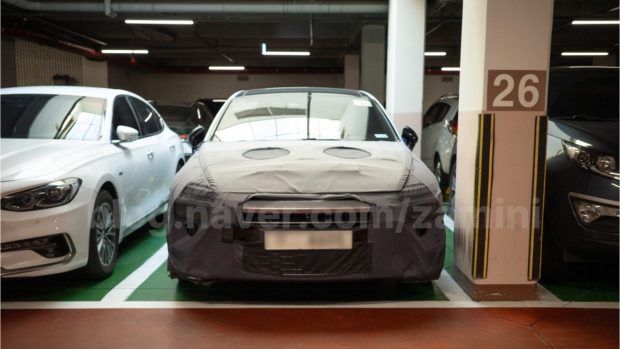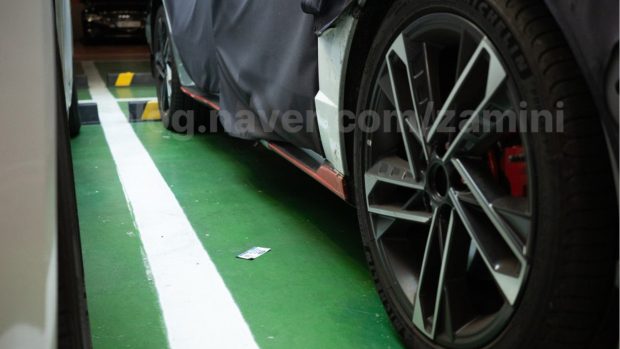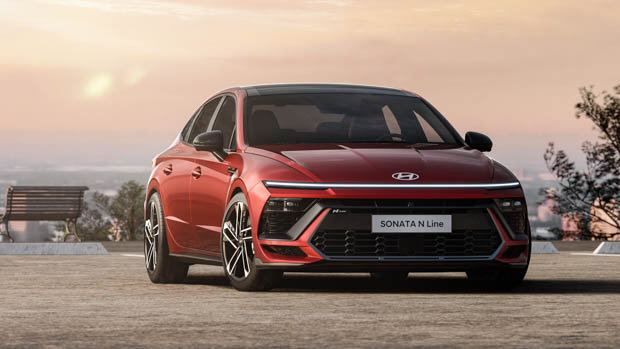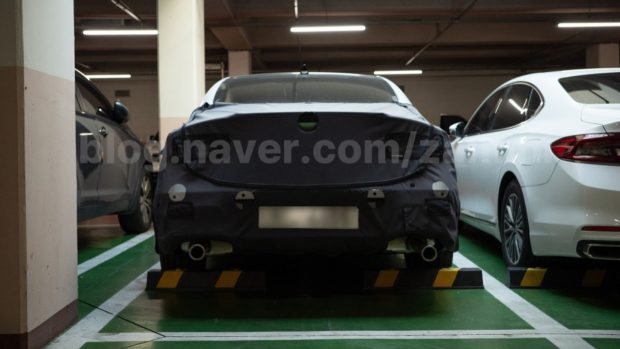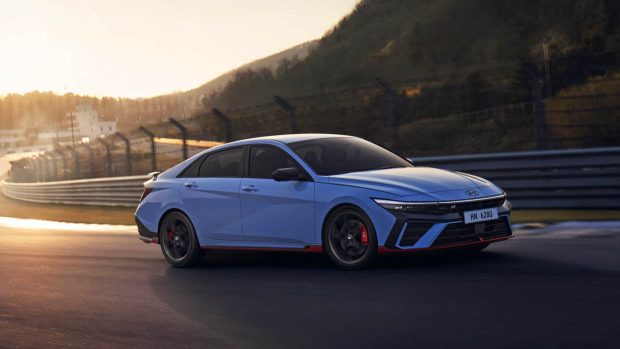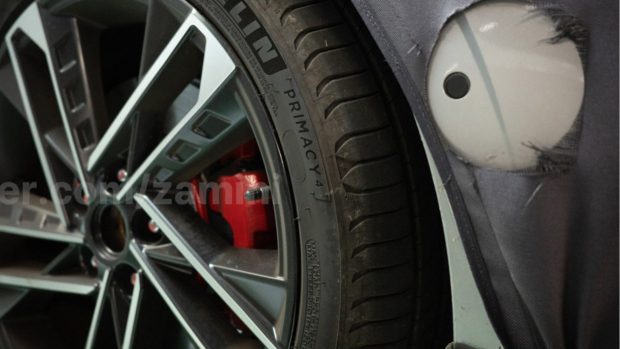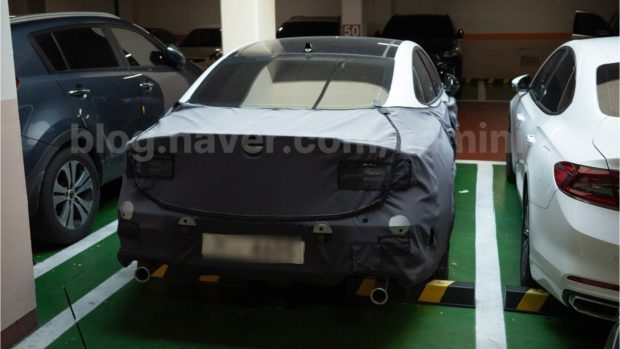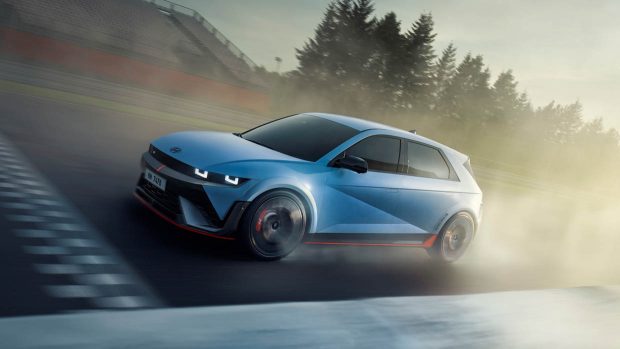-
Car Reviews
- All reviews
- Midsize SUVs
- Small cars
- Utes
- Small SUVs
- Large SUVs
- Large cars
- Sports SUVs
- Sports cars
- Vans
Latest reviews
- Car News
-
Car Comparisons
Latest comparisons
- Chasing Deals
Pictures have surfaced of what looks like it could be an N-performance version of Hyundai’s Sonata midsize sedan
Images have surfaced online of what looks like it could be a high performance N-variant of the Hyundai Sonata midsize sedan.
The pictures posted by a Korean blogger ‘Zamini’ and then picked up by the Korean Car Blog showcase what appears to be a heavily camouflaged Hyundai Sonata in a carpark, however looking closely reveals some design features generally associated with Hyundai’s high performance N-cars.
Those tell-tale visual signals include a red strip along the side skirts, and red brake calipers.
It’s not clear whether the car could actually be an official prototype being tested, or potentially something as simple as a previously unseen accessory pack as opposed to a fully-fledged N-model, however the pictures are intriguing nonetheless.
Interestingly, while there are some clear ‘N’ visual cues in the photographs, the wheels appear to be the same as the regular Sonata N-Line and the tailpipes look too small for a fully-fledged N.
Hyundai Australia – who declined to comment on the speculation – have only just debuted a substantial mid-life facelift of the Sonata, which has included a rework of the exterior styling and significant interior updates, however there hasn’t been any official word around a lurking potential N variant.
In fact, the current Sonata lineup in Australia is limited to one grade only – the Sonata N-Line, which we have just reviewed.
Not to be confused with the performance-focused ‘N’ sub-brand, the ‘N-Line’ sub-brand injects some sporty flavour and styling into grades that wear the badge, but without all the fruit of a fully kitted and engineered, track-focused ‘N’ model.
Hyundai already sells a high performance petrol sedan in Australia, the i30 Sedan N. So how would a potential Sonata N fit in the lineup?
Currently, the i30 Sedan N retails for $50,200 before on road costs and offers a slightly smaller, performance focused alternative to the larger Sonata N-Line which asks for $55,200 before on roads.
Both vehicles are front-wheel-drive – although the Sonata is available with all-wheel-drive overseas – and they both share the same eight-speed, wet dual-clutch automatic transmission as the brand’s i30 N hot hatch, though both i30’s are also available with a manual.
While the i30 Sedan N is powered by a 2.0-litre turbocharged petrol four-cylinder engine making for 206kW or power and 392Nm of torque, the Sonata N-Line is powered by a 2.5-litre turbo engine delivering 213kW of power and 422Nm of torque.
However, the i30 Sedan N is equipped with a limited-slip differential (LSD) and grippy Michelin Pilot Sport 4S tyres, making it the clear performance choice, as compared to the Sonata which lacks an LSD on the front axle and runs with an open diff. The Sonata N-Line also lacks adaptive dampers which come standard on the cheaper i30 Sedan N.
If an N version of the Sonata ever did eventuate, one would expect a higher tune to its engine and potentially all-wheel-drive in order to differentiate itself from the i30 Sedan N. Any such changes would no doubt push the Sonata nameplate well into $60K-plus territory for the first time.
Such a model would compete for a slice of a shrinking pie in the low-volume performance sedan market which in recent times has also seen the demise of sister brand’s Kia Stinger large performance sedan.
As well as this, Hyundai would need to navigate positioning and differentiation from its sister premium mark Genesis and its performance-luxury focused G70 midsize sedan which is priced between $63,000 and $84,324 depending on variant.
The Hyundai N division – which injected a previously unseen sporting credibility to the brand’s lineup when it launched in 2018 – is now evolving in the face of an electric future, which raises further interesting questions for what role a petrol-powered Sonata N could play if it ever did eventuate.
Currently, the Korean automaker offers three N Performance vehicles in its lineup – the i20 N small hatchback, i30 N hatchback, and i30 Sedan N. However, Hyundai has been open about the impending demise of the i20 N and i30 N turbo-petrol hatchbacks at the end of their current life cycles due to tough European emissions regulations, with the Kona N SUV also having recently been discontinued.
Hyundai is now steering the N brand’s focus onto electric performance vehicles like the Ioniq 5 N which is due for arrival in Australia in Q1 of next year as the company’s first mass-produced performance focused EV.
As well as this, the brand has also said that it is plotting an electric future for the i20 N and i30N hatchbacks to keep the affordable end of the performance market alive, and it has previously revealed a prototype previewing the Ioniq 6 N high performance electric sedan as well as the N Vision ‘74 hybrid electric-hydrogen supercar concept.
With this electric shift, the recently facelifted i30 Sedan N – known as the Elantra N in the US and as the Avante N in South Korea – will eventually be the only petrol-powered N-model to survive the upcoming petrol performance cull and live on into another generation,
That survival is largely because unlike the aforementioned hatchbacks, the small sedan – which isn’t available in Europe – focuses on the United States and South Korean markets where it achieves strong sales, and where emissions regulations aren’t as strict.
Latest news
About Chasing cars
Chasing Cars reviews are 100% independent.
Because we are powered by Budget Direct Insurance, we don’t receive advertising or sales revenue from car manufacturers.
We’re truly independent – giving you Australia’s best car reviews.
